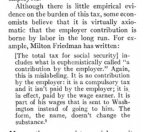- Joined
- Mar 14, 2012
- Messages
- 29,135
- Reaction score
- 1,520
- Location
- US, California - federalist
- Gender
- Male
- Political Leaning
- Liberal
It's campaign season, so there are at least a half-dozen "plans" to address one of the most popular programs ever created in the United States. No longer the "third rail" of political discourse, it is a welcome topic of discussion. Why? Because it is in trouble. The current $2.9 Trillion "trust funds" will be depleted by 2035. About its 100th birthday.What the 2019 Trustees’ Report Shows About Social Security (Center Budget Priorities).
Social Security has been the greatest social insurance program in the world. I say that, not because it is the best organized or funded, but because it has kept more people out of poverty for longer. Why Social Security Is a Success, in Four Charts (New Republic). It has been in effect for 84 years, so most Americans have no concept of a world without it.
Why is it in trouble? Demographics. Elizabeth Warren’s plan to expand Social Security, explained (Vox). So, the answers to fix it are pretty straightforward: fix the actuarial basis, cut benefits, or boost the tax base.
Since the first one smacks of a Soylent Green solution, let's concentrate on the second two. (Although one proposal, Promoting Economic Growth through Social Security Reform, does address the actuarial side of the equation by encouraging delayed applications.) Cuts have actually already been tried, unsuccessfully. The COLA formula was changed, and benefits have been delayed. Not only is this unpopular, but it hasn't fixed the problem.
There are several plans already out there, including the two I've already referenced. Half the Democratic field have proposals. [Why am I not discussing Republican plans? I haven't found any.] They should be considered, tweaked, and implemented. Editorial: Don’t delay reforms to shore up Social Security (Herald.net).
Like universal healthcare, Social Security can be a fundamental factor to strengthen our economy, rather than being a burden. In my view, people need to understand that.
I think we can eventually phase out social security by solving for simple poverty in our at-will employment States. Having recourse to an income as compensation for Capitalism's natural rate of unemployment could make social security redundant, more expensive, and unnecessary.


